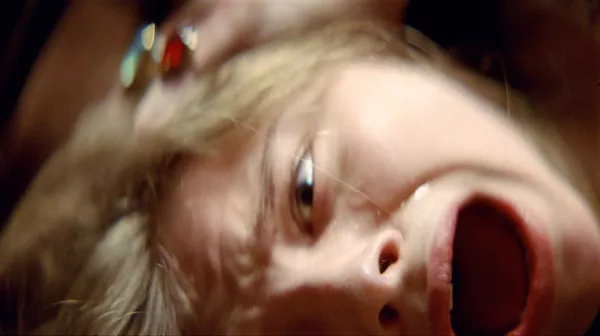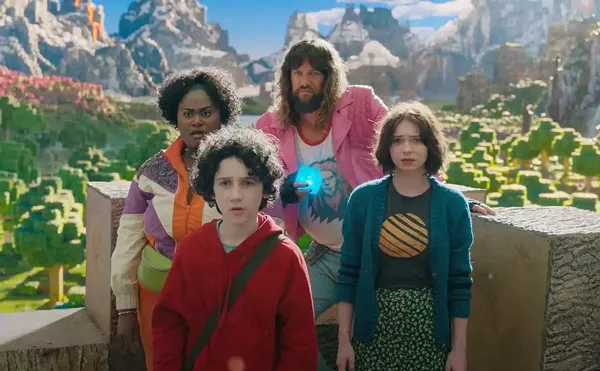
Let Me In
GRADE: B+
Tomas Alfredson's haunting and poignant Let the Right One In was one of the best releases of 2008. An eerie mixture of coming-of-age tale and vampire story,it explored the depths of adolescent alienation and suggested that the things that make us strong and the dark urges we hide from the world may be one and the same. For those who caught this haunting Swedish import, the idea of an American remake fell somewhere between "why bother?" and "please don't fuck it up."
Though Cloverfield director Matt Reeves brings changes to Let Me In — some good, some less so — the tone and composition of its predecessor remain surprisingly intact, never dumbing down its darker impulses while bringing a greater sense of style and narrative drive to the story.
Set in suburban New Mexico in the early 1980s, we meet the fragile and sullen-eyed Owen (Kodi Smit-McPhee), a 12-year-old loner who's bullied at school and whose newly single mom is a religious nut. One cold, snowy night in the courtyard outside his apartment he meets Abby ( Kick-Ass' Chlo Grace Moretz), a barefooted neighbor who smells funny, sometimes looks more like a boy than a girl, and seems strangely immune to the cold. Tentatively, the two connect and slowly become friends. But Abby is a vampire, tended to by a possessive middle-aged man (Richard Jenkins) who murders local residents to provide her with blood. Unfortunately, his attacks have grown sloppier and sloppier, gaining the attention of a local police officer (Elias Koteas).
Reeves has streamlined the story to good effect, removing Alfredson's more awkward plot devices (the CG cat attack is thankfully gone), playing up the ambiguous sexual identities of the kids, and focusing more intently on Owen and Abby's deepening relationship. The young actors' courtship is as unsettling as it is sweet, and though Moretz may not have the cadaverous, light-boned look that Lina Leandersson did in Let The Right One In , she provides Abby with an appropriately beyond-her-years maturity. Similarly, Jenkins brings a lot to his small role and, surprisingly, the disturbingly ambiguous nature of his relationship with Abby is left uncompromised.
Reeves' remake effectively inserts a few story refinements (Owen's love of Now & Later candies, how his mother's face is almost never shown) and stylistic flourishes, the best of which is a gut-churning car accident that maintains a dizzying backseat POV (creepily implicating the audience as perpetrators). Smartly, he adopts his predecessor's slow-build tension and detached establishing shots to add to the eeriness. Unfortunately, he also relies on unconvincing computer-generated effects to deliver the film's instances of shock and horror. It's a misstep that dispels his carefully crafted atmosphere.
And unlike Alfredson, who favored distant voyeuristic camera angles, Reeves moves in close to underline, even sentimentalize, the children's vulnerability, hurt and desperate sense of isolation. The film continually reminds us that nearly everything we are witnessing is from Owen's perspective, contrasting the boy's deep desire for connection with Abby's empathetic opportunism. It's a savvy setup for the film's final moments.
Let Me In 's '80s setting, however, is less successful. Though it lets Reeves skirt technological issues, crack cultural jokes (Boy George croons, "Do You Really Want To Hurt Me?"), and capitalize on the period's fear of satanism, his suggestion that the popularity of Reagan's "Evil Empire" speech and the country's economic malaise had us navely embracing a dangerously fearless champion (much as Owen does) is a bit of a stretch.
More tragically, Reeves overplays the film's bully subplot. Fueling our desire for revenge, he tries to wring catharsis from the brutal comeuppance exacted on Owen's teenage tormentors. It's a might-makes-right message that robs the film of its humanity. And by forgetting to give Owen something meaningful to leave behind, something that challenges his decision to embrace Abby's brutal inhumanity, Let Me In never achieves the proper sense of tragedy. It's what keeps this gorgeously shot and hauntingly delicate film from attaining the greatness it deserves.






